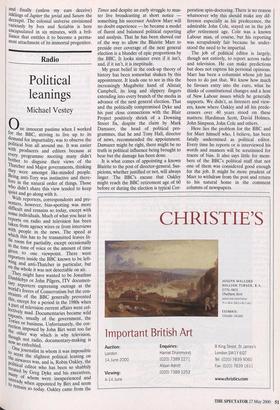Radio
Political leanings
Michael Vestey
One innocent pastime when I worked for the BBC, striving to live up to its demand for impartiality, was to observe the Political bias all around me. It was easier with producers and editors because at every programme meeting many didn't bother to disguise their views of the Thatcher and Major governments, thinking they were amongst like-minded people. 8eing anti-Tory was instinctive and there- fore in the natural order of things. Those Who didn't share this view tended to keep quiet and go along with it. With reporters, correspondents and pre- senters, however, bias-spotting was more difficult and remains so today, except with some individuals. Much of what you hear in reports on radio and television has been taken from agency wires or from interviews with people in the news. The speed at which this has to be transmitted leaves lit- tle room for partiality, except occasionally in the tone of voice or the amount of time given to one viewpoint. There were reporters inside the BBC known to be left- Wing and anti-Thatcher in particular, but on the whole it was not detectable on air. Tjhey might have wanted to be Jonathan rimblebys or John Pilgers, ITV documen- arY reporters expressing outrage at the world's forces of Conservatism but the con- straints of the BBC generally prevented this, except for a period in the 1980s when la Part of television current affairs went col- lectively mad. Documentaries became wild 11:.,°ses, usually of the government, the r Ones or business. Unfortunately, the cor- titecrion imposed by John Birt went too far though other way which is why television, ell-WI not radio, documentary-making is now so enfeebled. ro°ne journalist in whom it was impossible ., scent the slightest political leaning on he airwaves was, and is, Robin Oakley, the Political editor who has been so shabbily Imated by Greg Dyke and his executives, unallY of whom were inexperienced and to readY when appointed by Birt and seem remain so today. Oakley came from the Times and despite an early struggle to mas- ter live broadcasting at short notice something his successor Andrew Man will no doubt experience — he became a model of fluent and balanced political reporting and analysis. That he has been shoved out of the way to allow the Blairite Marr to preside over coverage of the next general election is a blunder of epic proportions by the BBC. It looks sinister even if it isn't, and, if it isn't, it is ineptitude.
My great belief in the cock-up theory of history has been somewhat shaken by this appointment. It leads one to see in this the increasingly Mugabeite hand of Alistair, Campbell, its long and slippery fingers extending into every branch of the media in advance of the next general election. That and the politically compromised Dyke and his past close connections with the Blair Project positively shriek of a Downing Street fix, despite the claim by Mark Damazer, the head of political pro- grammes, that he and Tony Hall, director of news, recommended the appointment. Damazer might be right, there might be no truth in political influence being brought to bear but the damage has been done. It is what comes of appointing a known Blairite to the post of director-general. Sus- picions, whether justified or not, will always linger. The BBC's excuse that Oakley might reach the BBC retirement age of 60 before or during the election is typical Cor- poration spin-doctoring. There is no reason whatsoever why this should make any dif- ference especially as his predecessor, the admirable John Cole, stayed on in the job after retirement age. Cole was a known Labour man, of course, but his reporting was scrupulously fair because he under- stood the need to be impartial.
The job of political editor is largely, though not entirely, to report across radio and television. He can make predictions but does not express his personal opinions. Marr has been a columnist whose job has been to do just that. We know how much he favours entry into the euro, what he thinks of constitutional changes and a host of New Labour issues which he generally supports. We didn't, as listeners and view- ers, know where Oakley and all his prede- cessors over 40 years stood on these matters: Hardiman Scott, David Holmes, John Simpson, John Cole and others.
Here lies the problem for the BBC and for Marr himself who, I believe, has been fatally undermined as political editor. Every time he reports or is interviewed his words and nuances will be scrutinised for traces of bias. It also says little for mem- bers of the BBC's political staff that not one of them was considered good enough for the job. It might be more prudent of Man to withdraw from the post and return to his natural home in the comment columns of newspapers.


































































 Previous page
Previous page